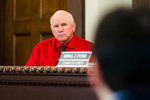








The Lewis County Board of Commissioners passed a resolution Monday ratifying the moratorium it passed earlier this month to temporarily halt the permitting process for projects seeking to extract water for sale and many forms of standalone food and beverage operations.
The moratorium came into existence as a result of concerns arising from a proposal submitted earlier this year by commercial bottled water giant Crystal Geyser a 100,000 square foot plant on the Cowlitz River near Randle that would remove 400 gallons of water per minute from the river. County officials decided to allow standalone food and beverage manufacturing on rural land last year, a change that was meant to accommodate the growing agro-tourism industry but inadvertently left the door open for large-scale industrial use.
“If you were going to have an apple juice facility or a facility that processed blueberries into food or beverage that you could sell, that we were thinking, well, ‘why does it matter if you grow your blueberries right here or your apples right here as opposed to getting them from the other side of the state, or maybe getting grapes for a winery from Oregon or California?’” said Eric Eisenberg, civil deputy prosecutor for Lewis County.
The moratorium took effect when county commissioners passed an ordinance enacting the measure on Aug. 6 in order to prevent Crystal Geyser from submitting a permit application that would be grandfathered in ahead of any new, prohibitive regulations. Ratification was required following a public hearing, which took place during Monday during the regular legislative meeting of the BOCC.
Members of the Lewis County Water Alliance, which requested the moratorium in order to give county staff and the Lewis County Planning Commission time to study possible remedies to close the unintended loophole, showed up but did not contribute much comment other than a loud round of applause following the vote to ratify.
Former county commissioner Ron Averill testified in favor of the moratorium. He stated his agreement with the other stakeholders present that there is a need to study how a massive industrial installation would impact the environment as well as water quality for those who rely on the Cowlitz River for personal and agricultural use.
The planning commission is scheduled to take up the issue during its regularly scheduled meeting at 6 p.m. today at the Lewis County Courthouse. The agenda for the planning commission includes a “workshop on proposed code changes to Chapter 17.42 LCC, Table 1: Land Use Summary, relating to Resource Uses (E. Standalone food or beverage manufacturing).”
Eisenberg said Monday that there have been discussions among county staff about the potential routes they in conjunction with the planning commission could explore in order to correct the mistake that led to the Crystal Geyser controversy. Those include changes to the zoning table or to the definitions attached to specific zoning designations, as well as the possible introduction of performance standards attached to some zones, which would require additional conditions be met for certain permitted uses within the zoning table.
“Members of the planning commission have not had near the same amount of time that county staff or even members of the Lewis County Water Alliance have had to study this issue,” Eisenberg said. “I suspect the workshop will cover the broad strokes about policy and what issues the members see and want to explore further.”
The moratorium is in place for a six-month term and will expire in December unless the county commissioners decide to extend or otherwise change the parameters of the ordinance. It includes an exception to allow the taking of water for the study of potential sale, which allows Crystal Geyser to continue its own studies related to the issue as county officials do the same.
Commissioner Gary Stamper, whose district includes the site of the proposed bottling facility, thanked members of the Lewis County Water Alliance for filling the benches inside commission chambers on a regular basis and said he hopes those who attend have gained an understanding of how county government processes information and makes decisions based on the needs of their constituency.
“We would hope that the benches would be full every week for people to listen and see what’s going on,” Stamper said. “Sometimes it’s rather boring, but I hope it provides a snapshot of what we do and try to do to represent the people of Lewis County.”